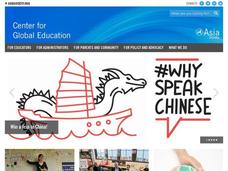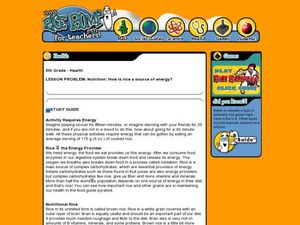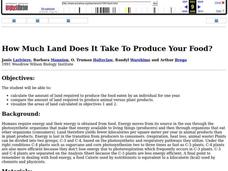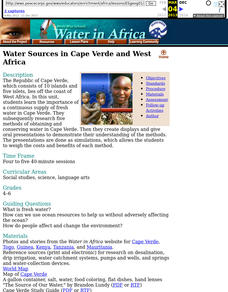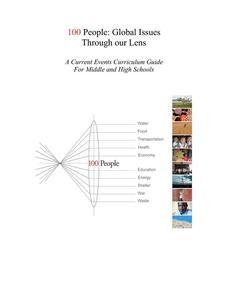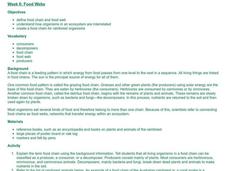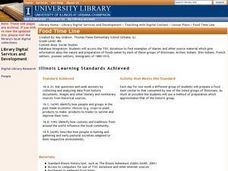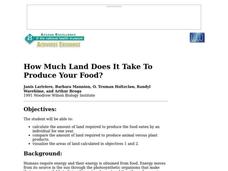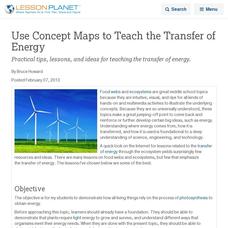US National Archives
WWII: The Atlantic 1939-45 – Battle of the Atlantic
The most dangerous line of attack during World War II wasn't the German planes soaring above Britain, but the U-Boats cutting off their supplies of food and equipment. Learners research the Battle of the Atlantic, the German campaign to...
Curated OER
Geography and Culture of China
Take out a map, a paper, a ruler, and those coveted colored pencils for a lesson on Chinese culture and geography. This is a multifaceted approach to basic geography skills that incorporate story telling, class discussion, primary source...
Curated OER
Biodegradable Plastics
Sixth graders explore the many uses of corn as a renewable source. In this biodegradable resource lesson, 6th graders investigate how corn is used in manufacturing and as a fuel. Students construct a piece of homemade plastic using...
Curated OER
Sources of Energy
Students research various methods for preparing food and analyze energy sources. They explain that radiation, light, and heat are forms of energy used to cook food, treat diseases, and provide energy.
Curated OER
Rice as a Source of Energy
Fifth graders investigate the nutrition in rice. In this rice lesson, 5th graders discover that rice is a great source of energy. Students compare foods to rice to see the differences in the nutritional value. Students classify foods in...
Curated OER
Food Poisoning
Identify strategies that prevent food-borne illnesses and contamination. National Standard 14.4.1 Identify food-borne illness Identify types of food-borne illness and their symptoms: botulism, e-coli, hepatitis, salmonella, staphylococci...
Curated OER
Biotechnology, GMOs and Food
Twelfth graders explore controversy around genetically modified foods, identify source of controversy, and role play town hall meeting on genetically modified foods, to examine viewpoints and arguments for and against genetic modification.
Curated OER
The Effects of Pesticides on the Food Chain
Fourth graders generalize that all animals, including people, depend on plants as a food source. In this science lesson plan, 4th graders describe and construct a food chain, tell how pesticides enter the food chain, and discuss possible...
Curated OER
Ethical Ways to Acquire and Distribute Fish as a Food Source
Students complete a variety of activities as they examine the ethics of acquiring and distributing fish as a food source. They touch on the ethics involved in genetically modified salmon, as well.
Curated OER
How Much Land Does It Take To Produce Your Food?
Students calculate the amount of land required to produce the food eaten by an individual for one year. They compare the amount of land required to produce animal versus plant products. Students visualize the areas of land calculated.
Curated OER
Chemistry of Food
In this chemistry of food worksheet, students complete 20 various types of questions related to food and nutrition. First, they complete a crossword puzzle with vocabulary terms. Then, students use the figure shown to write the...
Curated OER
Photosynthesis: Using the Sun to Make Food
In this photosynthesis worksheet, students learn how plants use the sun to convert energy into food. They then answer 10 questions using the information they just read. The answers are on the last page.
Curated OER
Steps to a Healthier You
Students explore the food pyramid. In this dietary health lesson plan, students examine the food pyramid on the MyPyramid.gov website and discuss healthy eating strategies. There are various links to websites in this lesson plan.
Albert Shanker Institute
Economic Causes of the March on Washington
Money can't buy happiness, but it can put food on the table and pay the bills. The first of a five-lesson unit teaches pupils about the unemployment rate in 1963 and its relationship with the March on Washington. They learn how to create...
Curated OER
Fun Food Quiz: True or False?
Pupils participate in a quiz activity designed to either introduce or review concepts of healthy eating and healthy foods.
Curated OER
Water Sources in Cape Verde and West Africa
Young explorers study the scarcity and importance of a continuous supply of fresh water in Cape Verde. They research the five main ways that fresh water is obtained in these countries. Each research group prepares a presentation, and...
100 People Foundation
100 People: Global Issues Through Our Lens
If the world were 100 people...17 would not have access to safe drinking water, 18 would not be able to read or write, and 52 would not have a primary education. Using the theme of "100 people," this resource explores other major issues...
Curated OER
Food Webs
Students research rainforest animals and use that information to make a flow chart to show the order in which energy is transferred through several organisms. They label the producers, consumers, and decomposers in their chart.
Curated OER
Food Time Line
Fourth graders make a timeline to include the immigrants of 1880-1910. Then, in groups, they research foods consumed, purchase, and serve it to the class.
Curated OER
How Much Land Does It Take To Produce Your Food?
Students calculate the amount of land required to produce the food eaten by an individual for one year and compare the amount of land required to produce animal versus plant products. They use calorie counting resources to compile the...
Curated OER
Food Webs
Fourth graders discover how organisms depend upon each other in an ecosystem. In this ecosystems lesson plan, 4th graders use food webs to discuss the interdependence between organisms in an ecosystem.
DocsTeach
Sequencing from Seeds to Harvest
Explore the farm to table experience in a fast-paced lesson on gardening. The activity uses image sequencing to help young scholars understand the process of growing food from seed to harvest. Academics also participate in group...
Curated OER
Use Concept Maps to Teach the Transfer of Energy
Practical tips, lessons, and ideas for teaching the transfer of energy.
Out-of-School Time Resource Center
Nutrition and Physical Activity
Emerging nutritionists explore what it means to be healthy. In the beginning of the unit, your class will examine the five food groups and learn how food gets from the farm to our plates. This leads into the investigation of the...
Other popular searches
- Food Sources
- Food Origins
- Aboriginal Food Sources
- Esl Food Sources
- Food Origins Of
- Science Sources of Food



